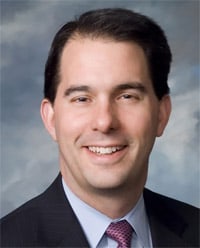Anti-union governor Scott Walker delivered more than a tough blow to Democrats last night, surviving a recall attempt and sending a signal to conservative Republicans that unbridled Super-PAC funding and massive spending is the key to winning GOP races around the nation. Labor unions lost big, as did Obama.
With nearly all of the vote counted, Walker had 53% to 46% for his Democratic challenger, Tom Barrett, the mayor of Milwaukee.
The recall race was anxiously watched by strategists in both parties as a possible harbinger of the presidential election, and the outcome was a major defeat for Democrats and their labor union allies. The heavy turnout of conservatives and voters in Republican strongholds suggested that at least here, the 2012 electorate continues to look much like the one that delivered power to the GOP in 2010.
Reuters reports:
Wisconsin Governor Scott Walker scored more than a personal victory in Tuesday's state recall vote. He delivered a psychological boost for the Republicans and a blow to Democrats that could linger until the November 6 U.S. presidential election.
Walker, a Republican, sailed to a surprisingly easy win over Democrat Tom Barrett, ending a bitter 15-month political battle over Walker's efforts to eliminate most collective-bargaining rights for Wisconsin's public sector unions.
Many of Walker's national supporters – who flooded the state with anti-Barrett ads and gave Walker a more than 7-to-1 financial advantage – saw the results as a vindication of his take-no-prisoners brand of fiscal conservatism.
Labor unions just couldn't compete with the massive spending in the race, The Hill reports:
The fight to recall Walker was the biggest battle labor has waged in years — and to their credit, Democratic turnout was sky-high Tuesday. But Republicans managed to outpace them, aided by nearly $30 million spent by Walker.
Democrats and unions were outspent by a two to one margin by the governor and his allies in the race, the most expensive in Wisconsin history.
Much of unions' diminishing political strength stems from a loss in membership, which has been on the decline for decades. Last year, just 12 percent of American workers were union members, down from more than one-third in the 1950s and about 20 percent in the early 1980s.
Barrett concedes, AFTER THE JUMP…





